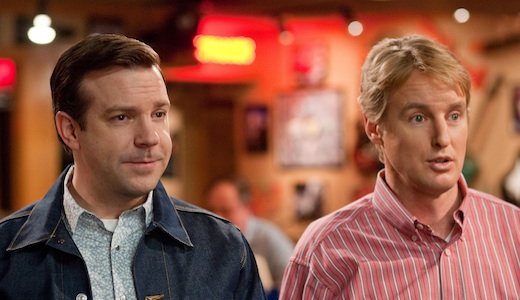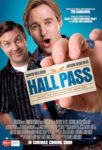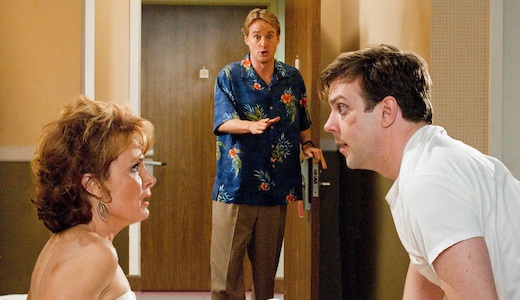Bobby and Peter Farrelly, collectively known as the Farrelly brothers, have been producing mass chuckles for almost two decades. Getting their big break on the classic Seinfeld episode “The Virgin”, they broke through and conquered Hollywood with the Jim Carey/Jeff Daniels flick Dumb & Dumber.
Through a string of hits including There’s Something About Mary, Me, Myself and Irene and Shallow Hal, the brothers became known for pushing the boundaries of good taste from semen hair gel to making Gwyneth Paltrow fat. Yet being almost a decade since their last film of any note (Stuck on You), one begins to wonder if the glory days of the brothers are behind them.
Friends Rick (Owen Wilson, How Do You Know) and Fred (Jason Sudeikis, TV’s 30 Rock and The Bounty Hunter) lead contented married lives with their respective wives Maggie (Jenna Fischer, US TV’s version of The Office) and Grace (Christina Applegate, Cats & Dogs: The Revenge of Kitty Galore). After a series of misadventures, the wives agree to give their partners a ‘hall pass’: a week off marriage in which they have the freedom to choose to live up the single bachelor lifestyle or remain faithful to the wives. Teaming up with their friends, they attempt to paint the town red but still turn in for bed at a reasonable hour.
When the Farrelly brothers were at the top of their game, they were known for their irreverent brand of comedy. Yet the intervening years have seen the line between good taste and bad blurred, crushed, trodden on and generally subverted by the likes of Adam McKay, Judd Apatow, Kevin Smith and practically anything that Seth Rogen has been involved in. There are a series of scenes in the first half of Hall Pass when the less-than-dynamic duo attempt to get back into the bachelor saddle, but merely wind up eating large meals and going to bed by 9:30. This seems to be what has happened to the brothers Farrelly, as they attempt to return to the kind of ‘outrageous’ comedy that they were once known for, but merely wind up bloated and obviously out of touch.
Ironically, it is these earlier moments in the film that actually work the best, with Wilson and Sudeikis’ sheer cluelessness charmingly appealing. Wilson downplays his typically over-the-top hapless persona, comfortably fitting into the role of the husband and father going through an early mid-life crisis of sorts, and Sudeikis is not so different so as to cause us to ponder why these people are friends in the first place. However, unlike Todd Phillips The Hangover (and to a lesser extent Due Date), Hall Pass does not so much provide us with a wild escape from this suburban lifestyle, so much as an embarrassing mirror akin to the ones in clothing store change rooms.
There is surprisingly very little sex – or even sexual humour – in Hall Pass, despite the obvious set-up for the subject matter. Much of the film meanders around the various exploits of Rick and Fred’s ragtag group of friends. Tried-and-true hash brownie gags abound, coupled with a completely unnecessary scene in which comedian Larry Joe Campbell (Killers) defecates on a golf course, may have played back in 1997, but by 2011 they seem as tired as the supporting cast who are clearly going through the motions. An angry barista (Derek Waters) comes across as just plain stupid in his attempt to capture a certain demographic, but outstays his welcome by several scenes.
In two major crimes against cinema, Richard Jenkins (Let Me In) is bafflingly cast as the party-hard friend with the tradition role of teaching them the secrets of getting laid, while the criminally underused British comedian Stephen Merchant (from The Office and Extras, but most recently heard on Gnomeo & Juliet) is really only given one good scene after the end-credits have rolled. Hall Pass is an amalgam of these kinds of wasted opportunities and missed marks, and it is disappointing to see that while audience tastes may have moved on (for better or for worse), the Farrelly brothers have not.
The Reel Bits: A disappointing effort from a team that is collectively capable of so much more. Hall Pass not only fails to find an audience, but fails to identify who that audience is. It is enough to make you want to get a nice long hall pass from comedies.
Hall Pass is released on 3 March 2011 in Australia from Roadshow Films. We also covered the Hall Pass Red Carpet premiere this week.








